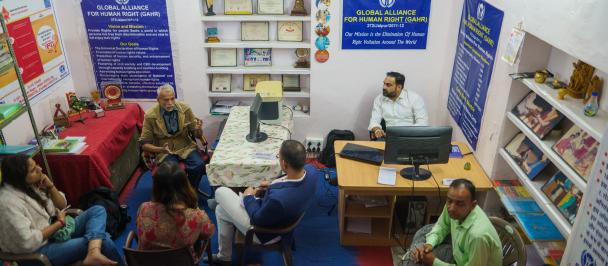Government of India and UNDP partner to strengthen rabies control programme
September 28, 2023

Stray dogs on the streets of Ahmedabad, India
As the COVID-19 pandemic unfolded, many experts pointed to zoonosis – the transmission of diseases from animals to humans – as the likely culprit. COVID-19 has underscored the need to prioritize a holistic approach to disease control and pandemic management, known as One Health, that recognizes the interconnection between people, animals, plants and their shared environment. The One Health approach is vital for predicting, preventing, detecting and responding to global health threats.
Among zoonotic diseases, rabies is of significance because it is almost always fatal. This neglected tropical disease is transmitted through the bite of rabid animals, primarily dogs. Rabies is however preventable, if there is timely post-exposure treatment in the form of a multi-dose vaccination.
According to global estimates from the World Health Organization, 59,000 people die each year due to dog mediated rabies, with India contributing nearly a third of this total. The fight against rabies in India faces multiple challenges, including the persistent issue of low vaccination coverage and the need for improved coordination and information sharing across the different sectors and stakeholders involved in combating this disease.
The Centre for One Health, under the Ministry of Health and Family Welfare’s National Centre for Disease Control (NCDC), requested the support of the United Nations Development Programme (UNDP) in India to supplement its efforts to strengthen rabies prevention and control through digitalization of rabies vaccinations. The digitalization process will involve real-time monitoring of rabies vaccine stocks and tracking of beneficiaries, as well as ensure that all doses of the rabies post-exposure prophylaxis regimen are administered.
UNDP and the Government of India have a long-standing partnership in promoting innovative and scalable digital solutions for health. This partnership has seen the development of multiple digital health solutions that have been brought to scale, such as the Electronic Vaccine Intelligence Network (eVIN), and Winning Over COVID (CoWIN). The systems help to strengthen and facilitate the various aspects of the vaccination process, from digitizing information on vaccine stocks, to registrations, immunizations and issuing digital vaccine certificates.
The digitalization of rabies vaccinations will be a crucial strategy under the National Action Plan for Dog Mediated Rabies Elimination by 2030 , launched by the Government of India in September 2021. Achievement of this goal will bring India a step closer to fulfilling the Sustainable Development Goal 3 target of "ending the epidemics of AIDS, tuberculosis, malaria and neglected tropical diseases," while also advancing towards universal health coverage.
The National Action Plan envisages a stepwise approach to mobilize multiple sectors and communities to work together to create long-term solutions towards dog mediated rabies elimination. This involves the development of action plans at both the state and central government levels .
In the initial phase, a helpline is being set up to provide information relating to the availability of vaccines at specified rabies vaccination centers and first aid measures to be taken after dog and other animal bites. The helpline will also provide a means to report and monitor cases of dog and other animal bites. The helpline will be initially launched in the states of Andhra Pradesh, Madhya Pradesh, Assam, and union territories of Delhi and Puducherry.
UNDP is also collaborating with the Centre for One Health, NCDC and state & union territory governments to support the development and implementation of the state/union territory and district action plans. A series of state-level consultations were organized to kick off this initiative. The first state-level consultation took place in Puducherry, in southern India in April 2023. Addressing the inaugural consultation, which brought together over 80 stakeholders from the health, animal husbandry, wildlife and municipal departments, as well as academic institutions and civil society organizations, the Lieutenant Governor of Puducherry, Dr. Tamilisai Soundararajan, remarked that elimination of rabies required a coordinated effort from all relevant departments.

Lieutenant Governor of Puducherry, Dr. Tamilisai Soundararajan at the consultation on the Development of State Action Plan for Dog Mediated Rabies Elimination by 2030
In August 2023, another two-day state-level consultation was organized in Chennai for Tamil Nadu.

Consultation on the Development of Tamil Nadu State Action Plan for Dog Mediated Rabies Elimination by 2030
Addressing the workshop, Dr. Simmi Tiwari, Joint Director, Centre for One Health, NCDC reiterated the need for collaboration. She also noted that if departments worked in silos, the Action Plan would not be as effective. All departments should pool their resources and implement the Action Plan together.
Tamil Nadu Government’s Additional Chief Secretary, Animal Husbandry, Mr. Mangat Ram pledged full support to the efforts to eliminate rabies by 2030 and committed to actively drive the implementation of the state action plan in the districts of Tamil Nadu.
These initiatives to eliminate dog mediated rabies in India is supported by the UNDP-led Access and Delivery Partnership.

 Locations
Locations

